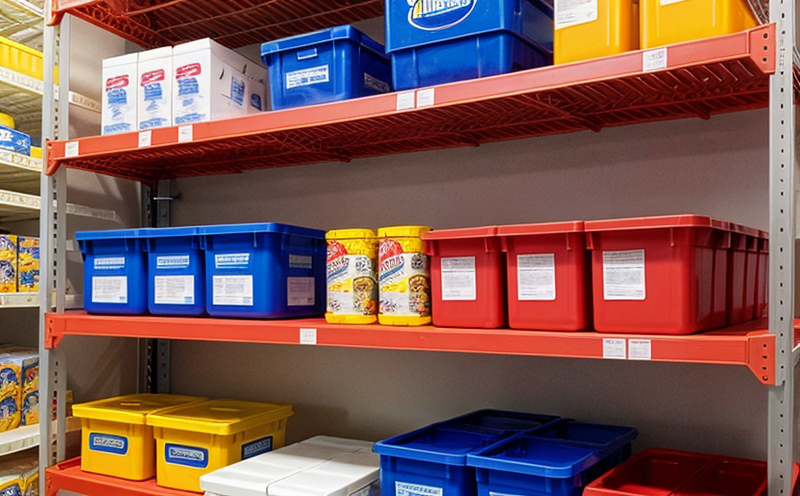ISO 78912 Shelf Life Profiling in Spices and Condiments
The ISO 78912 standard is a cornerstone for ensuring that spices and condiments maintain their quality, safety, and sensory attributes over extended periods. This service focuses on the shelf life profiling of these products using the methodologies prescribed by this international standard. Shelf life profiling helps manufacturers understand how various factors such as temperature, humidity, light exposure, and storage conditions influence the stability and quality of spices and condiments.
Spices and condiments are highly complex food products that contain a wide range of volatile compounds, which can degrade over time if not properly managed. The degradation process is influenced by numerous variables, making it crucial to conduct thorough shelf life studies using standardized techniques like those outlined in ISO 78912.
Our laboratory adheres strictly to the requirements set forth by ISO 78912, ensuring that our clients receive accurate and reliable data on how long their products can be stored before quality begins to decline. This information is essential for setting appropriate shelf life guidelines that balance consumer safety with product efficacy and economic considerations.
Shelf life profiling typically involves the following steps:
- Determining initial baseline measurements of key parameters such as color, aroma intensity, pH levels, and total volatile bases (TVB).
- Storing samples under controlled conditions that represent real-world scenarios where products might be exposed to different temperatures and humidities.
- Regularly assessing the changes in product characteristics over time.
The results of these assessments are then analyzed using statistical methods to define a shelf life threshold. This threshold is based on when significant quality changes begin to occur, ensuring that products remain safe and palatable for consumers well beyond this point.
For spices and condiments specifically, the complexity introduced by their chemical composition necessitates careful attention during both sample preparation and analysis phases. Proper handling ensures accurate representation of the product's true characteristics throughout the profiling process.
Our experienced team employs advanced analytical techniques including gas chromatography-mass spectrometry (GC-MS), high-performance liquid chromatography (HPLC), and sensory evaluation panels to capture detailed insights into each spice or condiment being tested. These methods allow us not only to measure changes in physical properties but also to assess perceived quality attributes such as flavor intensity and mouthfeel.
The insights gained from ISO 78912 shelf life profiling are invaluable for several reasons:
- They inform packaging decisions aimed at extending product stability during transportation and distribution.
- They support formulation adjustments intended to enhance product longevity.
- They contribute towards meeting regulatory requirements related to food safety and quality assurance.
In summary, ISO 78912 shelf life profiling provides critical information regarding the optimal storage conditions for spices and condiments. By adhering strictly to this international standard, we deliver precise data that helps our clients optimize their processes while ensuring consistent product quality throughout distribution channels.
Customer Impact and Satisfaction
The impact of effective shelf life profiling on customer satisfaction cannot be overstated. When manufacturers understand the exact duration for which their products will maintain their intended qualities, they can make informed decisions about packaging materials and storage conditions that extend product freshness. This leads to higher consumer trust since it ensures that purchased items are safe and enjoyable when consumed.
From a business perspective, accurate shelf life determination also reduces waste by preventing overstock situations caused by overly conservative estimates. It allows companies to maximize inventory turnover rates without compromising on quality standards. Furthermore, meeting regulatory expectations enhances brand reputation among both domestic and international markets.
A satisfied customer base translates directly into increased sales volume due to repeat purchases based on reliable product performance history provided through rigorous testing protocols like those employed here at our laboratory.
International Acceptance and Recognition
The global nature of the spice industry means that adherence to international standards is vital for ensuring consistent quality across borders. ISO 78912 has gained widespread acceptance worldwide, making it a universally recognized benchmark for shelf life profiling in various sectors including spices and condiments.
Recognized by regulatory bodies such as the Food and Agriculture Organization (FAO) of the United Nations, ISO 78912 offers a harmonized approach to measuring changes in food quality over time. This standardization promotes interoperability among laboratories operating under different jurisdictions, facilitating smoother international trade practices.
Compliance with this standard not only satisfies legal requirements but also demonstrates a commitment to excellence that resonates well within the marketplace. Consumers increasingly seek out brands whose products meet stringent international standards, thereby enhancing brand loyalty and market share expansion opportunities for participating organizations.
Competitive Advantage and Market Impact
Adopting ISO 78912 shelf life profiling offers several competitive advantages:
- Enhanced Product Quality: Detailed understanding of how storage conditions affect product quality allows for better control over the final consumer experience.
- Increased Consumer Trust: Consistent results aligned with international standards build confidence among customers, fostering long-term relationships.
- Better Resource Management: Precise shelf life predictions minimize unnecessary stock levels and reduce waste, optimizing resource utilization.
- Innovation Opportunities: Insights derived from these studies can inspire new product formulations or improved packaging solutions.
The broader market impact extends beyond individual companies to encompass the entire supply chain. By setting higher industry standards for shelf life determination, ISO 78912 contributes to a more robust and reliable food sector capable of meeting evolving consumer expectations globally.





